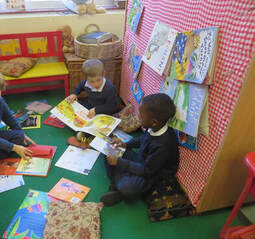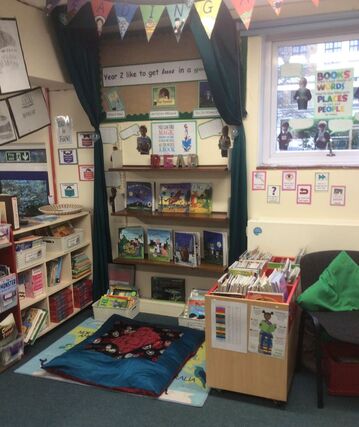To view our termly newsletter, please click on the links below:
|
Mrs Moore – English Subject Leader
In English Martyrs School we aim to create an environment where children are enabled to communicate confidently and effectively in all aspects of language; reading, writing, speaking and listening. These skills are taught and developed in their own right and through cross curricular links. Our aim is for every child to gain a love of the world of literature and communication. We have an excellent school library containing a wide range of fiction and non-fiction books. In addition, each classroom has its own book area. Our aim is that every child will leave our school having developed a love of books and reading. |
Intent‘English should be untethered and encouraged to roam around the school’ (Ruth Baker –Leask) English is at the centre of our teaching and learning and is essential to every aspect of the curriculum and school life. Language and the spoken word – We aim to provide a language rich curriculum – centred on vocabulary development, oracy and reading. We want our children to be able to express themselves through speech and written word ensuring they have the tools to enable them to fulfil their potential throughout their lives. Our children communicate through speaking and listening, reading and writing. The quality and variety of spoken language underpins the development of vocabulary, grammar, reading and writing. Reading ‘A child who reads will be an adult who thinks.’ (Unknown) At English Martyrs we aim to develop a love of reading in every child so that they are lifelong learners, critical thinkers and have a better understanding of the world, people and cultures. |
Implementation
Spoken word
We encourage our children to speak clearly, fluently and confidently The National Curriculum states that pupils should be taught to speak clearly and convey ideas confidently as often as possible. We ensure that all children are given these opportunities in class and by providing various opportunities for participation - drama, assemblies, end of term productions, presentations and debating through our thematic curriculum. These opportunities also help to increase children’s confidence and self-esteem and gives each child a voice.
Reading
We teach our children the two elements of reading:
Word Recognition - phonics
In Early Years and KS1 we place a strong emphasis on phonics as this lays the foundations for successful reading. We believe that if we give our children a secure knowledge of phonics together with automatic word recognition, that’s when reading takes root. When children learn to read at an early age they have greater general knowledge, wider vocabulary and become more fluent readers. All children are taught to read through fiction, non-fiction and poetry.
Nursery to Year 2 – We follow the Letters and Sounds programme –
Children in Years 1, 2 and 3 work together in phase groups to ensure targeted teaching of the needs of the children
Year 3 – transition continuing Letters and Sounds for those who need the extra input
Years 4-6 – Any child who still needs phonics for example children new to the school are taught in small groups following the appropriate phase of the Letters and Sounds programme.
Comprehension
Comprehension is one of the key characteristics of reading. It increases the pleasure of reading and develops deeper understanding. Teachers plan using high-quality texts to teach the higher order reading skills of comprehension and immerse children in the language of books, vocabulary, grammar, punctuation and spelling.
Comprehension is taught in all classes; in the Early years through verbal questioning and interactions with the children.
We develop comprehension skills using the Retrieve, Infer, choice model and move from Guided Reading to Guiding Readers.
Year 1 children develop these skills through carefully planned guided reading sessions
Year 2 children begin to use a Reading Journal and explore comprehension through their class reading book. They still have guided reading sessions to ensure specific skills are taught to targeted groups.
Year 3 begin to use their Reading Journals more often and develop their comprehension through whole class novel. During the first and second term guided reading sessions are still taught to aid transition.
Year 4/5/6 use their reading journals. They use high quality texts linked to their thematic curriculum and plan comprehension through guiding readers sessions, focussing on specific skills each lesson. Children also have access to individual reading where necessary and standard comprehension – style questions and answers are also used at times.
In all classes there is a recommended booklist (drawn up from reliable education sources) for each class. Teachers will guide the children to these books in EYFS and Years 1. During Year 2 and year 3 children may begin to choose their own books from list with teacher guidance. By Year 4,5 and 6 children will be expected to choose reading books from list and read all (or as many as possible) books on list during the year.
Each classroom has a carefully chosen library and inviting reading area with key skills on display.
All children have a home/school reading record book.
Library – we have a well-stocked fiction and non-fiction library to which all children have access.
Reading is promoted through all subjects and classes always have non-fiction reference books linked to their topic available to children.
We celebrate World Book Day by holding a World Book Week. We also strongly encourage children to continue reading during summer holidays by participating in Tower Hamlets Reading Challenge.
We encourage our children to speak clearly, fluently and confidently The National Curriculum states that pupils should be taught to speak clearly and convey ideas confidently as often as possible. We ensure that all children are given these opportunities in class and by providing various opportunities for participation - drama, assemblies, end of term productions, presentations and debating through our thematic curriculum. These opportunities also help to increase children’s confidence and self-esteem and gives each child a voice.
Reading
We teach our children the two elements of reading:
- Word recognition – ability to recognise words in and out of context and ability to apply phonics.
- Comprehension – ability to process text, understand its meaning and to integrate with what the reader already knows.
- We recognise the importance of both elements and we teach the skills through a variety of methods.
Word Recognition - phonics
In Early Years and KS1 we place a strong emphasis on phonics as this lays the foundations for successful reading. We believe that if we give our children a secure knowledge of phonics together with automatic word recognition, that’s when reading takes root. When children learn to read at an early age they have greater general knowledge, wider vocabulary and become more fluent readers. All children are taught to read through fiction, non-fiction and poetry.
Nursery to Year 2 – We follow the Letters and Sounds programme –
Children in Years 1, 2 and 3 work together in phase groups to ensure targeted teaching of the needs of the children
Year 3 – transition continuing Letters and Sounds for those who need the extra input
Years 4-6 – Any child who still needs phonics for example children new to the school are taught in small groups following the appropriate phase of the Letters and Sounds programme.
Comprehension
Comprehension is one of the key characteristics of reading. It increases the pleasure of reading and develops deeper understanding. Teachers plan using high-quality texts to teach the higher order reading skills of comprehension and immerse children in the language of books, vocabulary, grammar, punctuation and spelling.
Comprehension is taught in all classes; in the Early years through verbal questioning and interactions with the children.
We develop comprehension skills using the Retrieve, Infer, choice model and move from Guided Reading to Guiding Readers.
Year 1 children develop these skills through carefully planned guided reading sessions
Year 2 children begin to use a Reading Journal and explore comprehension through their class reading book. They still have guided reading sessions to ensure specific skills are taught to targeted groups.
Year 3 begin to use their Reading Journals more often and develop their comprehension through whole class novel. During the first and second term guided reading sessions are still taught to aid transition.
Year 4/5/6 use their reading journals. They use high quality texts linked to their thematic curriculum and plan comprehension through guiding readers sessions, focussing on specific skills each lesson. Children also have access to individual reading where necessary and standard comprehension – style questions and answers are also used at times.
In all classes there is a recommended booklist (drawn up from reliable education sources) for each class. Teachers will guide the children to these books in EYFS and Years 1. During Year 2 and year 3 children may begin to choose their own books from list with teacher guidance. By Year 4,5 and 6 children will be expected to choose reading books from list and read all (or as many as possible) books on list during the year.
Each classroom has a carefully chosen library and inviting reading area with key skills on display.
All children have a home/school reading record book.
Library – we have a well-stocked fiction and non-fiction library to which all children have access.
Reading is promoted through all subjects and classes always have non-fiction reference books linked to their topic available to children.
We celebrate World Book Day by holding a World Book Week. We also strongly encourage children to continue reading during summer holidays by participating in Tower Hamlets Reading Challenge.
- Whole School Text Overview
Supporting Reading at Home
|
English Martyrs Catholic Primary School, St Mark Street, London. E1 8DJ
Tel. 020 7709 0182 |
|


